Iranian MP Says Identifying Poverty Culprits ‘Secondary Concern’
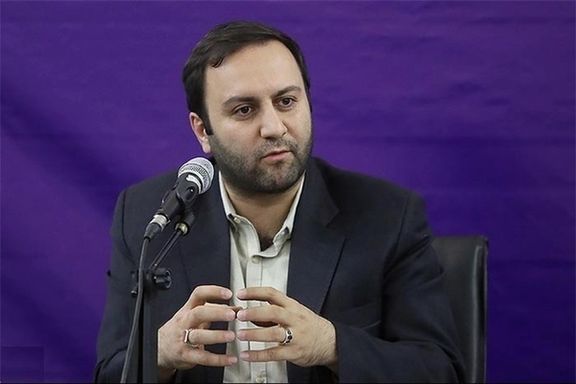
An Iranian lawmaker says identifying the culprits behind the livelihood pressure on citizens is a “secondary concern” and should not be “exploited by media opportunism”.

An Iranian lawmaker says identifying the culprits behind the livelihood pressure on citizens is a “secondary concern” and should not be “exploited by media opportunism”.
Referring to the alarming impoverishment of one-third of the Iranian population, Mohsen Pirhadi, the vice-chairman of the parliamentary committee for Iran’s Seventh National Development Plan said on Wednesday, "The rise in the country's population who live below the poverty line to 28 million is not solely attributable to policies implemented in the last two or three years."
Despite launching 12 development plans since the 1940s, aimed at building infrastructure, establishing key industries, and expanding public services and education, Iran still remains classified as a developing country, with an average economic growth rate of only 2.5 percent during the Islamic Republic.
Pirhadi further added that the impoverishment of such a significant portion of the population is a complex issue that “cannot be reduced to individual actions or political labels. Instead, it necessitates an in-depth examination and reevaluation of policies that have contributed to the economic decline of a substantial section of society.”
The "poverty line" in Iran represents the income level that covers the minimum essential needs of a household, with incomes below this line categorized as "absolute poverty." According to Iranian officials, the poverty line for residents of Tehran is approximately 300,000,000 rials (approx $600) per month, which is three times the minimum wage in Iran.
Like the other regime officials, he denied that the issue of widespread impoverishment is due to recent policies but said it is instead a result of various factors, including sanctions, the devaluation of the national currency, and management inefficiencies, which have accumulated over the past decade.
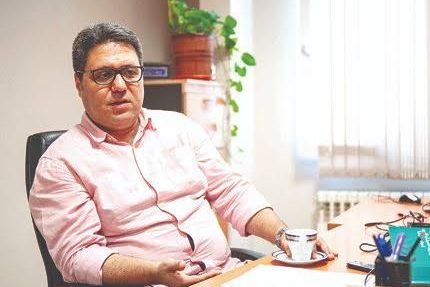
Iran's Migration Observatory has once again raised the alarm about the ongoing trend of brain drain.
Bahram Salavati, the director of the Observatory highlighted the regime's lack of attention towards the issue and revealed that the observatory's funding has been cut, and an order to vacate their building has been issued.
"We have spoken many times about the migration process of elites…, but unfortunately we have been condemned," said Bahram Salavati expressing his frustration over the lack of support for their efforts to mitigate the brain drain phenomenon.
Ali Hosseini, the Deputy Director of Human Capital Development of the International Science and Technology Interaction Center, also admitted the lack of efforts by the regime to combat the reduction of migration.
Hosseini also raised concerns about the potential return of seven million Iranians living abroad, questioning whether the country has the necessary capacities to absorb and effectively utilize its valuable human resources.
However, according to a survey conducted by the Iranian Migration Observatory, the desire to return to the country is diminishing, with only 14% of Iranians abroad having a definite desire to come back. A significant 62% expressed no intention of returning, while 24% were undecided. Moreover, over 90 percent of respondents did not believe in the government's promises regarding the utilization of the potential of Iranians living abroad.
In March, the institute's research claimed that the UAE hosts the highest number of Iranians living abroad with over 450,000 Iranian-born residents, followed by the US, Canada, Germany, Turkey and the UK, as Iranians seek a better quality of life.
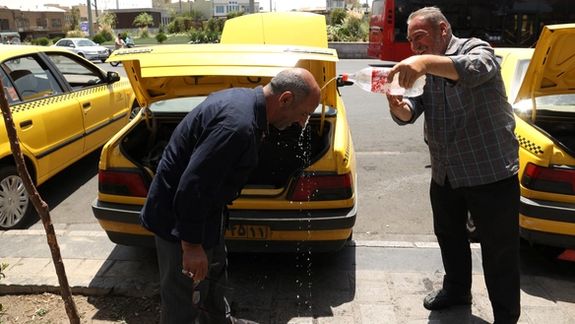
Iran’s two-day shutdown was announced as a measure to reduce health risks, but many believe it is a ruse to distract from electricity, gas and water shortages.
The Iranian government has declared a national holiday on Wednesday and Thursday, with speculations that it could extend to Saturday, claiming that the move is to safeguard the well-being of its citizens as temperatures soar.
Pedram Pakain, the spokesperson of the Health Ministry, said the holidays may be extended due to the heatwave, a statement reiterated by Interior Minister Ahmad Vahidi.
Social media, where Iranians still freely voice their thoughts on the truths behind the regime's trickery, saw many voicing concern that the national holidays could be a prelude to raise fuel prices, an impending eventuality that the government keeps postponing in fear of its consequences.
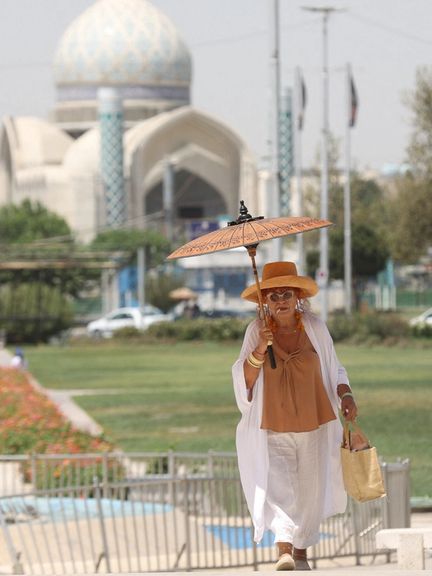
Iranians have seen far hotter days and no shutdowns in the past. Reformist activist and former political prisoner Hadi Mehrani shared a letter by Iran’s Prosecutor-General Mohammad Jafar Montazeri, who has ordered prosecutors across the country to summon leaders of Women, Life, Liberty protests – the ones no longer in prison – to warn them against organizing fresh protests ahead of the anniversary of the death of Mahsa Amini that sparked the uprising in September. He suggested that the holidays may be related to the mass call-out.
Payam-e Ma newspaper cited an informed yet unnamed source from the Energy Ministry as saying that the reason behind the shutdown was the country's electricity shortages. The constant rise in temperatures and decrease in rainfall across the country in the last decade have made electricity supply a challenge during peak consumption periods that happen in summers in Iran. In July, Iran’s electricity usage hit a record of 72,500 megawatts, increasing strain on power grids that were already struggling to meet demand.

"High temperature and increased electricity consumption in the past days have led the hydroelectric power plants of Karun-3 and Karun-4 dams – on the Iranian river with the highest water flow -- to produce electricity beyond their nominal capacity," the daily said. The power plants were reportedly generating electricity for more than 20 hours per day in the past several days, leading to a "depletion of water resources," which caused the plants to "temporarily cease production."
Power plant capacity and fuel supply are both inadequate to meet demand, and blackouts regularly happen in summer. Even so, Iran exports electricity to Iraq. In dire need of significant investment, Iran's electricity sector has failed to realize its annual growth plan for several years in a row, while consumption continues to grow, in part driven by extremely low prices.
The country needs at least five to seven percent electricity generation growth annually to address the increase in domestic demand. It has been an ongoing problem for the country which has one of the biggest natural oil and gas reserves in the world. In 2021, mass protests erupted after nationwide blackouts. With current tensions and an ongoing economic crisis, another mass breakdown could revive the unrest which has swept the country since September.
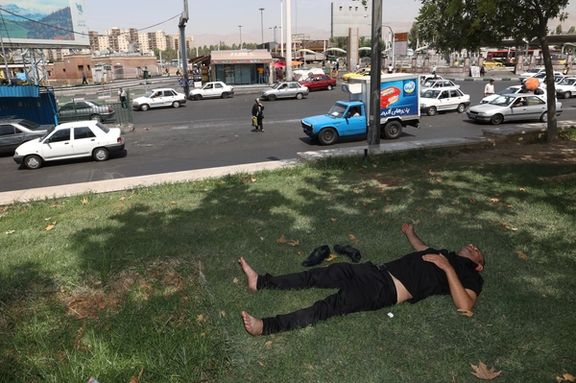
Iranian environmentalist Kaveh Madani -- the former deputy head of Iran's department of environment who heads the United Nations University Institute for Water, Environment and Health, reacted to the theories in a thread of tweets on Wednesday, stating that Iran’s bankruptcy of water, electricity, and gas cannot be solved by simply shutting down the country.
“Even if you build hundreds of dams, without proper management, the water will eventually run out!” he said, explaining that the problem of “Iran’s water, gas and electricity bankruptcy cannot be solved by shutting down just as the problem of dust and air pollution was not solved by shutting down.”
Madani added that the roots of Iran’s gas bankruptcy bear striking resemblance to the roots of its water bankruptcy but there is a crucial difference in the water and energy sectors: Iran's water is naturally limited, but the country holds one of the world's largest natural gas reserves.
Echoing the same argument, Nikahang Kowsar, a water issues analyst, told Iran International that a lack of planning for the use of renewable energy and disregarding climate change in the regime’s development policies have brought Iran to a point of no return.
No matter what the reason behind the shutdowns, Iranians are worried. Worried that it may be a ploy to avert their attention from something bigger and worried that regular shutdowns will be their new normal because they have seen that the regime is incapable of solving such problems for good.
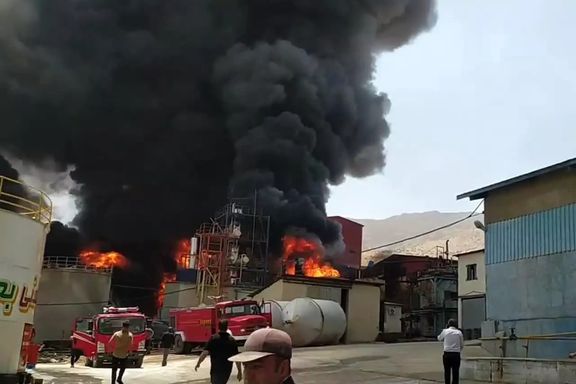
A massive fire erupted at an industrial zone in Doroud, southwest Iran on Wednesday leaving two people hospitalized.
An official from the Lorestan provincial authority said the fire occurred in the tanks of the Gohar petro-refinery with 16 fire trucks dispatched to the scene. The cause of the blaze remains unknown.
Farhad Ziviar, the governor of Lorestan said all available equipment in Lorestan province, as well as neighboring provinces such as Markazi were mobilized to control the fire. Speaking from the scene, he said there were concerns about the spread of the fire to the gasoline tanks located in the vicinity.
In recent years, there have been a number of explosions and fires near Iran's military, nuclear, and industrial facilities.
In March, there was a large fire at three warehouses belonging to a home appliances manufacturer and in January, a huge fire broke out at an Iranian military industry factory in Esfahan in what was believed to be a suspected drone strike. Iran blamed the strike on Israel though the claims were never confirmed.
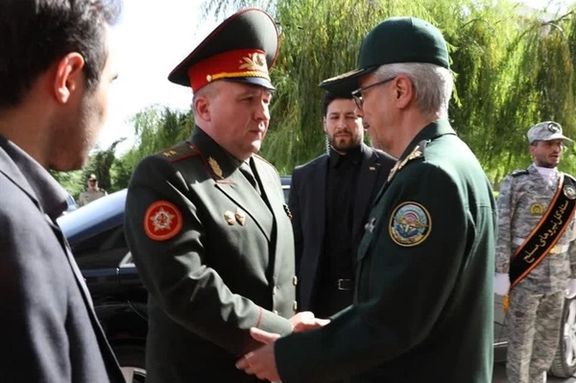
Iran and Belarus signed a defense cooperation deal, prompting the Iranian Armed Forces' General Staff to stress the importance of boosting mutual “defense ties”.
During a meeting with Viktor Gennadievich Khrenin, the Minister of Defense of Belarus, Mohammad Bagheri emphasized that global power shifts necessitate expanding security and military relations between Iran and Belarus.
The two sides also discussed the establishment of a joint commission for military cooperation.
Earlier, on Monday, Minister Khrenin signed a memorandum of understanding on defense cooperation with Mohammad Reza Ashtiani, the Iranian Defense Minister, in Tehran.
Details of the agreement have not been disclosed by the authorities of either nation. However, the Institute for the Study of War, a Washington-based think tank, published a report indicating Belarus' involvement in the establishment of an Iranian drone manufacturing plant in the south, specifically in the Gomel region.
Iran has faced extensive international criticism for supplying hundreds of Shahed-type kamikaze drones to Russia, reportedly used to target civilian infrastructure and residential areas in Ukraine. Additionally, American intelligence agencies have raised concerns about the construction of a drone factory in Russia with the assistance of the Islamic Republic.
Iran has supplied hundreds of drones to Russia since mid-2022, angering the United States and its key European allies who have imposed sanctions on a host of companies and individuals involved in their production and shipment to Russia.
Belarus is a key ally of Russia in its actions in Ukraine and a vital base for a portion of the Russian army and military mercenaries from the Wagner Group.
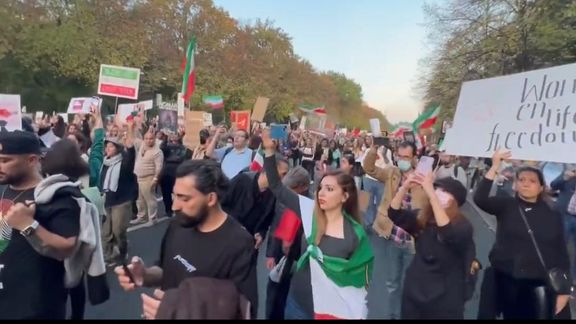
German-Iranians blasted Freiburg’s municipal government in Germany for voting last week to retain a twin city partnership with the Iranian city of Esfahan.
A majority of city council members from the left-wing parties, Greens and Social Democrats, rejected a motion from three small parties to end the controversial twin city partnership as protest to the Iranian regime’s gross human rights violations.
Iranian born Kazem Moussavi, who has campaigned for over twenty years against the dual city partnership, told Iran International that “It doesn’t matter to Mayor Martin Horn and his allies that independent civil society in Esfahan (Isfahan) is severely censored and brutally suppressed.
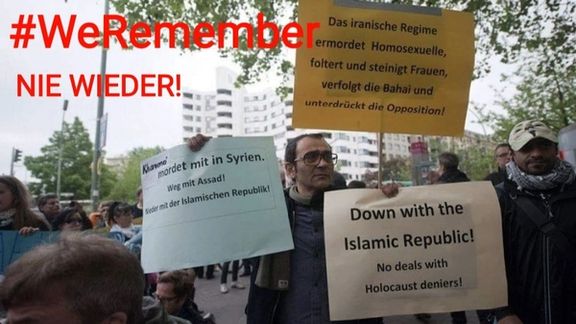
Dissidents and artists such as rapper Toomaj Salehi and Heshmatollah Tabarzadi were recently sentenced to long prison terms in Esfahan’s notorious torture prison, which is on the US sanctions list. Several women have also been executed there in recent months.”
The Freiburg Mayor has faced criticism from Amnesty International for going to great lengths to retain a city partnership with the clerical regime in Esfahan and for belittling grave human rights violations carried out by the regime.
According to the German media outlet SWR, Horn, who is not affiliated with a party, said he “wants to keep foot in the door” for the citizens of Iran by not shutting down the partnership. Horn refused to respond to numerous Iran International press queries.
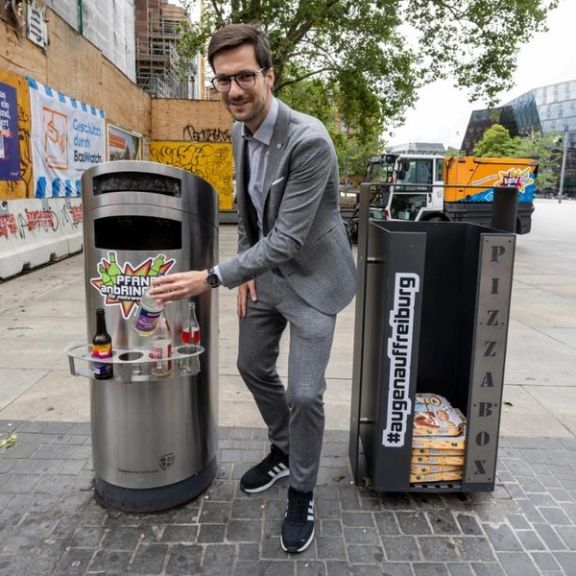
Moussavi, who is the spokesman for the Green Party of Iran in Germany, also criticized Horn and the city council members who voted to retain the partnership, because they are ignoring that the morality police have been reactivated in Esfahan to ensure women wear the compulsory hijab.
The city council leader for the Free Voters, Johannes Gröger, issued a statement on behalf of his party and the JUPI (Young, Urban, Polarizing and Inclusive) and FL (Make Freiburg worth living) parties. Gröger said, “The conditions in Iran, especially in our partner city Esfahan, are getting worse and worse. Human rights are trampled on. The rights of women are disregarded, and the number of executions is increasing.” He added that “This is also supported by the incumbent mayor of our partner city and the local leadership elite.”
Behrouz Asadi, the head of the Democratic Forum of Iranians in Mainz, issued a public letter to Martin Horn ahead of the vote, urging him to end the twin city partnership and “send a clear statement against torture and executions and for the release of all political prisoners, especially with respect to the previously mentioned musician Toomaj Salehi.”
Asadi told Iran International that the city of Freiburg “must end its contact with the regime and support the citizens.” He said his organization will send a letter to the parties in Freiburg who voted to retain the partnership. He said the “morality police must be abolished” and termed the clerical regime a “terror regime and a murderous regime.”
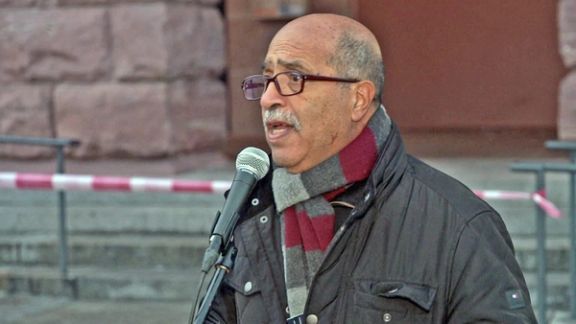
Asadi’s open letter was published in Persian and sent in German to Horn.
Freiburg, which is in the southwestern state of Baden-Württemberg, established its dual city partnership with Esfahan in 2000. Freiburg is the only city in Germany to have a municipal partnership with an Iranian regime-controlled city.
The German city of Weimar scrapped a partnership with Shiraz, in 2010, because regime officials on a trip to Germany refused to visit the Buchenwald concentration camp memorial.
The three parties opposed to the twin partnership in Freiburg said in their joint statement “The end of the twin city partnership should be a clear signal that Freiburg is committed to a world without oppression and human rights violations.”
Ulrich von Kirchbach, who serves as the Social Democratic Party’s cultural mayor in Freiburg, told SWR that “We don’t want to terminate any partnership because those who are now rebelling against the regime will feel completely abandoned.”
Simon Waldenspuhl, the leader of the JUPI political party, said the declaration issued by Freiburg in January is “too weak to express our contempt for such a brutal regime.” In January, Freiburg’s city government put the partnership on ice.
The FL city councilman, Wolf-Dieter Winkler, said “We increasingly must acknowledge that the persecution of people in Iran, including in our partner city Esfahan…even if declared dormant, no longer seems justifiable.
Horn is widely known as the German mayor who continues to do the heavy lifting for Iran’s regime via his strident activism to retain the dual city partnership. Critics argue Horn and the pro-Esfahan city council representatives have stained Freiburg’s reputation.
Sheina Vojoudi, who fled the Islamic Republic of Iran to Germany to escape persecution, told Iran International why a “German city prefers to turn a blind eye to all the human rights violations specifically in Esfahan.”

Vojoudi, who has been campaigning to end the partnership, added “Toomaj Salehi is a living proof of human rights violations in Esfahan who’s sentenced to six years and three months in prison for his critical rap songs. I would love to remind Freiburg of the Esfahan farmers who were shot by the regime forces for protesting severe water shortages. Hopefully the city council and the decision makers followed it closely that many of those innocent farmers lost their eyes.”
According to Vojoudi, who is an associate fellow for the Gold Institute for International Strategy, “Each partnership with this regime is a stab in our people’s back and of course mocks all the lives sacrificed and are being sacrificed for justice and humanity. Not condemnation but action proves that Germany truly cares for the human rights violations in Iran.”
Moussavi took Horn and the city council members, who support the partnership, to task for their alleged hypocrisy, noting that Esfahan is a center for Iran’s construction of atomic weapons, drones and rockets. Horn and the pro-partnership city council members ostensibly claim to be against jingoism and nuclear weapons.
Moussavi also sharply criticized the commissioner tasked with fighting antisemitism in Baden-Württemberg, Michael Blume, for failing to urge Mayor Horn and the city council members to pull the plug on the twin city partnership. Moussavi said “An antisemitism commissioner must not tolerate Freiburg’s relations with Esfahan, where Jews and other religious minorities are massively discriminated against and persecuted.”
Blume has faced massive criticism for lashing out at Iranian dissidents on Twitter as “corrupt exiled nationalists,” because they seek the toppling of the Islamic Republic and combat Iranian regime-sponsored Holocaust denial and antisemitism.
“Blume called people like me ‘corrupt exiled nationalists’ after I showed him leaked footage of Evin prison and told him that only criticism won’t help us and as a defender of human rights she should do more,” said Vojoudi.
She continued “But, in response, he insulted and discriminated against Iranians in exile. He called us corrupt but the rulers of their twin city [partnership], the officials of the Islamic Republic, are the most corrupt people on earth.”
Blume has refused to comment on his attacks on Iranian dissidents. In October, a court in Hamburg, Germany said statements made by Blume can be termed “antisemitic” and Blume’s critics can define him as “antisemitic.” The Simon Wiesenthal Center’s top Nazi hunter, Dr. Efraim Zuroff, urged Blume to resign.
Blume refused to answer Iran International media queries. The world-renowned human rights activist and former Soviet political prisoner, Natan Sharansky, told Iran International that Blume’s twitter activity is “antisemitic” because he stoked an anti-Jewish conspiracy theory.